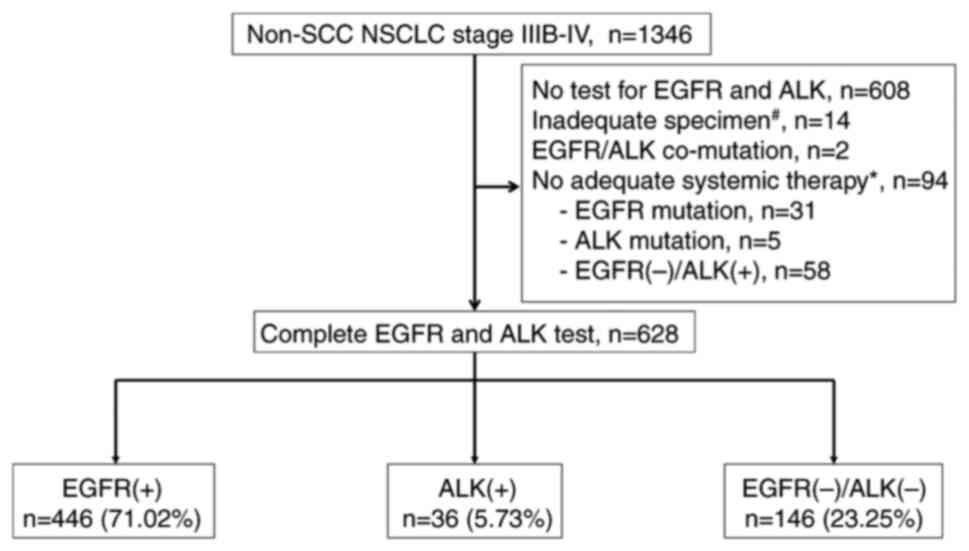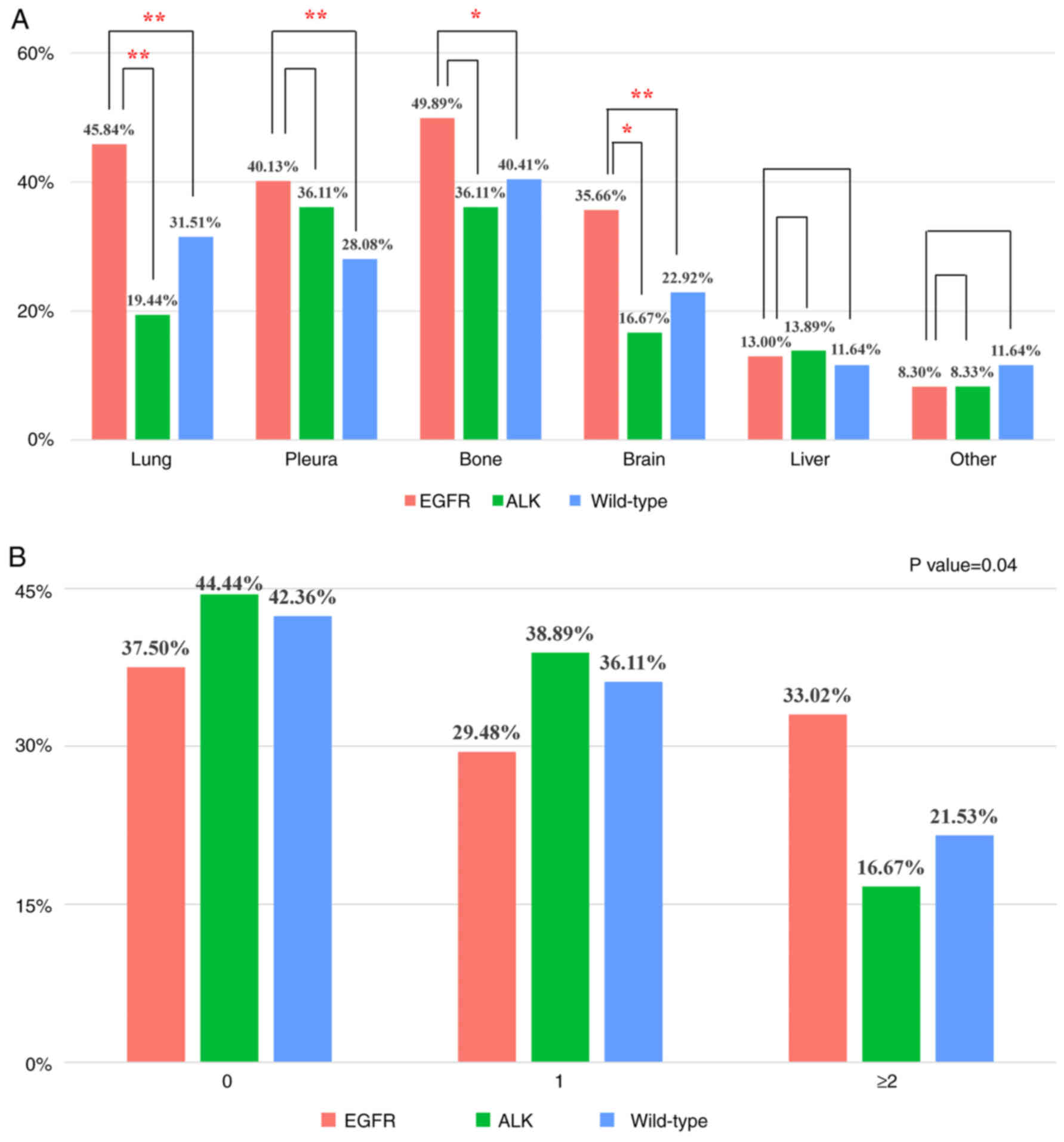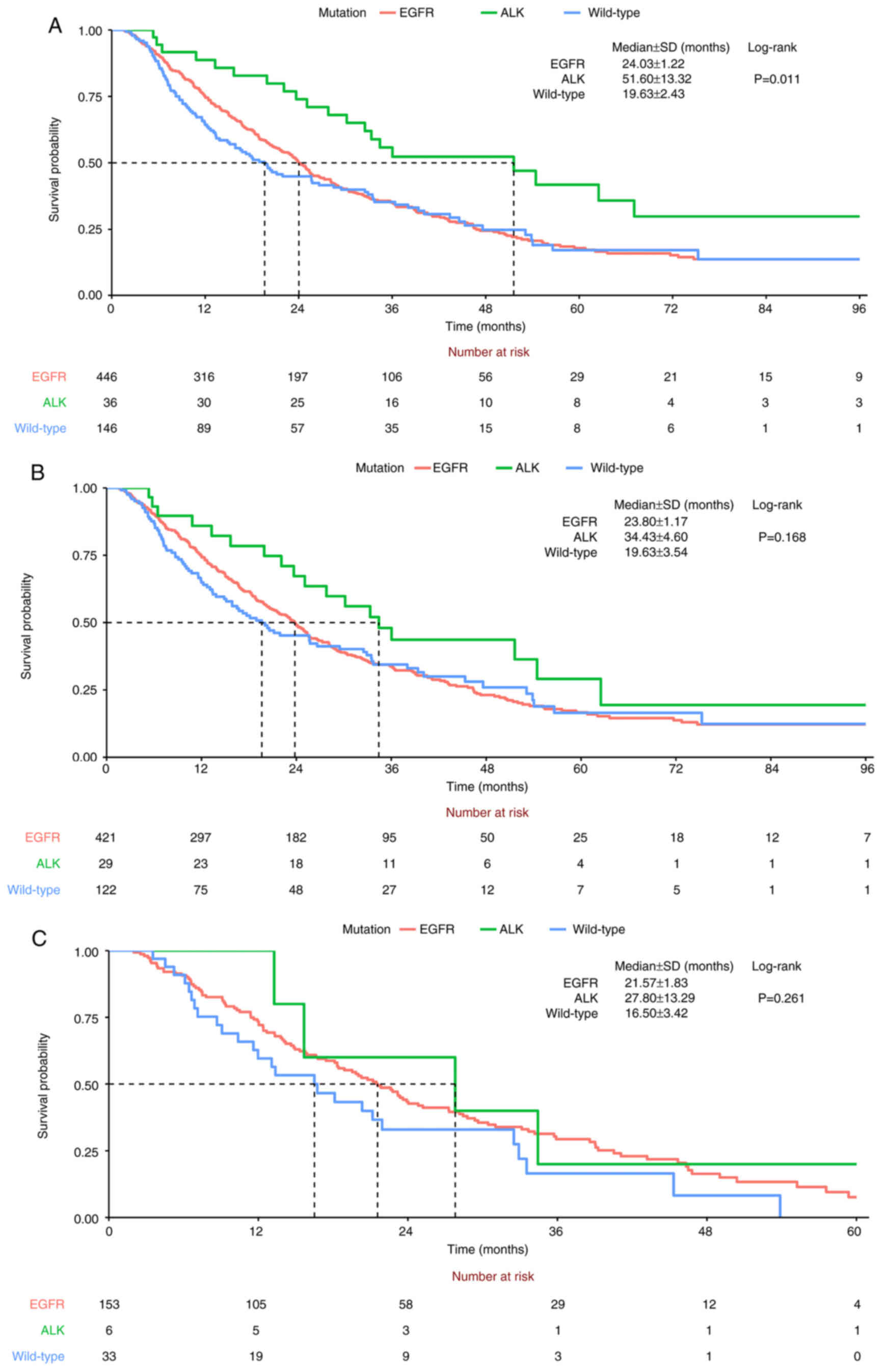|
1
|
Sung H, Ferlay J, Siegel RL, Laversanne M,
Soerjomataram I, Jemal A and Bray F: Global cancer statistics 2020:
GLOBOCAN estimates of incidence and mortality worldwide for 36
cancers in 185 countries. CA Cancer J Clin. 71:209–249. 2021.
View Article : Google Scholar : PubMed/NCBI
|
|
2
|
Ministry of Health and Welfare, . Cancer
Registry Annual Report, 2020 Taiwan. https://www.hpa.gov.tw/File/Attach/16434/File_21196.pdfMay
12–2024
|
|
3
|
Luo YH, Chiu CH, Scott Kuo CH, Chou TY,
Yeh YC, Hsu HS, Yen SH, Wu YH, Yang JC, Liao BC, et al: Lung cancer
in Republic of China. J Thorac Oncol. 16:519–527. 2021. View Article : Google Scholar : PubMed/NCBI
|
|
4
|
Tsao AS, Scagliotti GV, Bunn PA Jr,
Carbone DP, Warren GW, Bai C, de Koning HJ, Yousaf-Khan AU,
McWilliams A, Tsao MS, et al: Scientific advances in lung cancer
2015. J Thorac Oncol. 11:613–638. 2016. View Article : Google Scholar : PubMed/NCBI
|
|
5
|
Hsu KH, Ho CC, Hsia TC, Tseng JS, Su KY,
Wu MF, Chiu KL, Yang TY, Chen KC, Ooi H, et al: Identification of
five driver gene mutations in patients with treatment-naïve lung
adenocarcinoma in Taiwan. PLoS One. 10:e01208522015. View Article : Google Scholar : PubMed/NCBI
|
|
6
|
Graham RP, Treece AL, Lindeman NI, Vasalos
P, Shan M, Jennings LJ and Rimm DL: Worldwide frequency of commonly
detected EGFR mutations. Arch Pathol Lab Med. 142:163–167. 2018.
View Article : Google Scholar : PubMed/NCBI
|
|
7
|
Shaw AT, Yeap BY, Mino-Kenudson M,
Digumarthy SR, Costa DB, Heist RS, Solomon B, Stubbs H, Admane S,
McDermott U, et al: Clinical features and outcome of patients with
non-small-cell lung cancer who harbor EML4-ALK. J Clin Oncol.
27:4247–4253. 2009. View Article : Google Scholar : PubMed/NCBI
|
|
8
|
Schneider JL, Lin JJ and Shaw AT:
ALK-positive lung cancer: A moving target. Nat Cancer. 4:330–343.
2023. View Article : Google Scholar : PubMed/NCBI
|
|
9
|
Shin DY, Na II, Kim CH, Park S, Baek H and
Yang SH: EGFR mutation and brain metastasis in pulmonary
adenocarcinomas. J Thorac Oncol. 9:195–199. 2014. View Article : Google Scholar : PubMed/NCBI
|
|
10
|
Yang P, Kulig K, Boland JM,
Erickson-Johnson MR, Oliveira AM, Wampfler J, Jatoi A, Deschamps C,
Marks R, Fortner C, et al: Worse disease-free survival in
never-smokers with ALK+ lung adenocarcinoma. J Thorac Oncol.
7:90–97. 2012. View Article : Google Scholar : PubMed/NCBI
|
|
11
|
Soria JC, Ohe Y, Vansteenkiste J,
Reungwetwattana T, Chewaskulyong B, Lee KH, Dechaphunkul A, Imamura
F, Nogami N, Kurata T, et al: Osimertinib in untreated EGFR-mutated
advanced non-small-cell lung cancer. N Engl J Med. 378:113–125.
2018. View Article : Google Scholar : PubMed/NCBI
|
|
12
|
Ramalingam SS, Vansteenkiste J, Planchard
D, Cho BC, Gray JE, Ohe Y, Zhou C, Reungwetwattana T, Cheng Y,
Chewaskulyong B, et al: Overall survival with osimertinib in
untreated, EGFR-mutated advanced NSCLC. N Engl J Med. 382:41–50.
2020. View Article : Google Scholar : PubMed/NCBI
|
|
13
|
Mok T, Camidge DR, Gadgeel SM, Rosell R,
Dziadziuszko R, Kim DW, Pérol M, Ou SI, Ahn JS, Shaw AT, et al:
Updated overall survival and final progression-free survival data
for patients with treatment-naive advanced ALK-positive
non-small-cell lung cancer in the ALEX study. Ann Oncol.
31:1056–1064. 2020. View Article : Google Scholar : PubMed/NCBI
|
|
14
|
Hendriks LE, Kerr KM, Menis J, Mok TS,
Nestle U, Passaro A, Peters S, Planchard D, Smit EF, Solomon BJ, et
al: Oncogene-addicted metastatic non-small-cell lung cancer: ESMO
clinical practice guideline for diagnosis, treatment and follow-up.
Ann Oncol. 34:339–357. 2023. View Article : Google Scholar : PubMed/NCBI
|
|
15
|
Riley GJ, Wood DE, Ettinger DS, Aisner DL,
Akerley W, Bauman JR, Bharat A, Bruno DS, Chang JY, Chirieac LR, et
al: Non–Small Cell Lung Cancer, Version 4.2024, NCCN Clinical
Practice Guidelines in Oncology. J Natl Compr Canc Netw.
22:249–274. 2024. View Article : Google Scholar : PubMed/NCBI
|
|
16
|
Kim HR, Shim HS, Chung JH, Lee YJ, Hong
YK, Rha SY, Kim SH, Ha SJ, Kim SK, Chung KY, et al: Distinct
clinical features and outcomes in never-smokers with nonsmall cell
lung cancer who harbor EGFR or KRAS mutations or ALK rearrangement.
Cancer. 118:729–739. 2012. View Article : Google Scholar : PubMed/NCBI
|
|
17
|
Lin JJ, Cardarella S, Lydon CA, Dahlberg
SE, Jackman DM, änne PA and Johnson BE: Five-year survival in
EGFR-mutant metastatic lung adenocarcinoma treated with EGFR-TKIs.
J Thorac Oncol. 11:556–565. 2016. View Article : Google Scholar : PubMed/NCBI
|
|
18
|
Detterbeck FC, Boffa DJ, Kim AW and Tanoue
LT: The eighth edition lung cancer stage classification. Chest.
151:193–203. 2017. View Article : Google Scholar : PubMed/NCBI
|
|
19
|
cobas® EGFR Mutation Test v2
for in vitro diagnostic use. https://elabdoc-prod.roche.com/eLD/api/downloads/71bf89fb-e86d-ee11-2091-005056a71a5d?countryIsoCode=XGOctober
7–2024
|
|
20
|
Roche eLabDoc, . VENTANA®
anti-ALK (D5F3) Rabbit Monoclonal Primary Antibody ROW for in vitro
diagnostic use. https://elabdoc-prod.roche.com/eLD/api/downloads/0d3a124b-d03d-ed11-1791-005056a71a5d?countryIsoCode=XGOctober
7–2024
|
|
21
|
Oken MM, Creech RH, Tormey DC, Horton J,
Davis TE, McFadden ET and Carbone PP: Toxicity and response
criteria of the eastern cooperative oncology group. Am J Clin
Oncol. 5:649–655. 1982. View Article : Google Scholar : PubMed/NCBI
|
|
22
|
Hsu F, Nichol A, Toriumi T and De Caluwe
A: Miliary metastases are associated with epidermal growth factor
receptor mutations in non-small cell lung cancer: A
population-based study. Acta Oncol. 56:1175–1180. 2017. View Article : Google Scholar : PubMed/NCBI
|
|
23
|
Mendoza DP, Lin JJ, Rooney MM, Chen T,
Sequist LV, Shaw AT and Digumarthy SR: Imaging features and
metastatic patterns of advanced ALK-rearranged non-small cell lung
cancer. AJR Am J Roentgenol. 214:766–774. 2020. View Article : Google Scholar : PubMed/NCBI
|
|
24
|
Gibson AJW, Li H, D'Silva A, Tudor RA,
Elegbede AA, Otsuka SM, Bebb DG and Cheung WY: Impact of number
versus location of metastases on survival in stage IV M1b non-small
cell lung cancer. Med Oncol. 35:1172018. View Article : Google Scholar : PubMed/NCBI
|
|
25
|
Lynch TJ, Bell DW, Sordella R,
Gurubhagavatula S, Okimoto RA, Brannigan BW, Harris PL, Haserlat
SM, Supko JG, Haluska FG, et al: Activating mutations in the
epidermal growth factor receptor underlying responsiveness of
non-small-cell lung cancer to gefitinib. N Engl J Med.
350:2129–2139. 2004. View Article : Google Scholar : PubMed/NCBI
|
|
26
|
Corvaja C, Passaro A, Attili I, Aliaga PT,
Spitaleri G, Signore ED and de Marinis F: Advancements in
fourth-generation EGFR TKIs in EGFR-mutant NSCLC: Bridging
biological insights and therapeutic development. Cancer Treat Rev.
130:1028242024. View Article : Google Scholar : PubMed/NCBI
|
|
27
|
Ou SI, Nagasaka M, Brazel D, Hou Y and Zhu
VW: Will the clinical development of 4th-generation ‘double mutant
active’ ALK TKIs (TPX-0131 and NVL-655) change the future treatment
paradigm of ALK+ NSCLC? Transl Oncol. 14:1011912021. View Article : Google Scholar : PubMed/NCBI
|
|
28
|
Camidge DR, Kim HR, Ahn MJ, Yang JC, Han
JY, Lee JS, Hochmair MJ, Li JYC, Chang GC, Lee KH, et al:
Brigatinib versus crizotinib in ALK-positive non-small-cell lung
cancer. N Engl J Med. 379:2027–2039. 2018. View Article : Google Scholar : PubMed/NCBI
|
|
29
|
Solomon BJ, Bauer TM, Mok TSK, Liu G,
Mazieres J, de Marinis F, Goto Y, Kim DW, Wu YL, Jassem J, et al:
Efficacy and safety of first-line lorlatinib versus crizotinib in
patients with advanced, ALK-positive non-small-cell lung cancer:
Updated analysis of data from the phase 3, randomised, open-label
CROWN study. Lancet Respir Med. 11:354–366. 2023. View Article : Google Scholar : PubMed/NCBI
|
|
30
|
Camidge DR, Kono SA, Lu X, Okuyama S,
Barón AE, Oton AB, Davies AM, Varella-Garcia M, Franklin W and
Doebele RC: Anaplastic lymphoma kinase gene rearrangements in
non-small cell lung cancer are associated with prolonged
progression-free survival on pemetrexed. J Thorac Oncol. 6:774–780.
2011. View Article : Google Scholar : PubMed/NCBI
|
|
31
|
Alexander M, Wolfe R, Ball D, Conron M,
Stirling RG, Solomon B, MacManus M, Officer A, Karnam S, Burbury K
and Evans SM: Lung cancer prognostic index: A risk score to predict
overall survival after the diagnosis of non-small-cell lung cancer.
Br J Cancer. 117:744–751. 2017. View Article : Google Scholar : PubMed/NCBI
|
|
32
|
Wu SG, Yu CJ, Tsai MF, Liao WY, Yang CH,
Jan IS, Yang PC and Shih JY: Survival of lung adenocarcinoma
patients with malignant pleural effusion. Eur Respir J.
41:1409–1418. 2013. View Article : Google Scholar : PubMed/NCBI
|
|
33
|
Pezzuto F, Hofman V, Bontoux C, Fortarezza
F, Lunardi F, Calabrese F and Hofman P: The significance of
co-mutations in EGFR-mutated non-small cell lung cancer: Optimizing
the efficacy of targeted therapies? Lung Cancer. 181:1072492023.
View Article : Google Scholar : PubMed/NCBI
|
|
34
|
National Health Insurance Administration
and Ministry of Health and Welfare, . History of National Health
Insurance Drug Benefit Regulations. https://www.nhi.gov.tw/ch/cp-2192-9951a-2509-1.htmlSeptember
10–2024
|

















